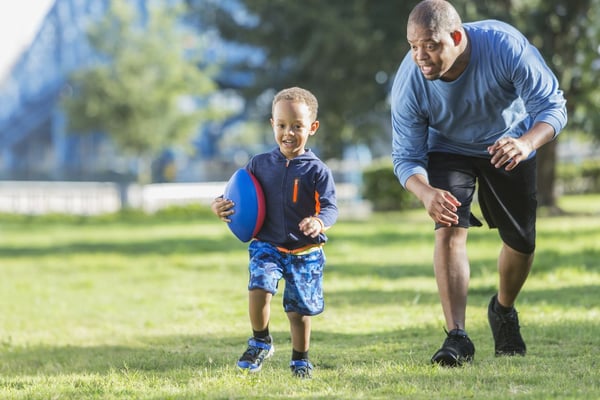As a parent coach and parenting instructor for over 20 years, I’ve seen many faces of misbehavior and supported hundreds of parents. Parenting is tough—a 24-7 job that challenges every part of us, yet it is deeply gratifying. Yet, sometimes our children trigger us in ways we never thought were possible. Then, we can react and jump to conclusions about our children’s behavior that are inaccurate and ineffective.
So why do children misbehave? And how can we prevent or eliminate misbehavior?
Estimated reading time: 6 minutes

Heartmanity is proud to partner with outstanding companies that we wholeheartedly recommend so this post may contain affiliate links. You can read our full disclosure here.
How children behave rarely has anything to do with what we think is happening. And if you’ve ever been a parent witnessing your child’s tantrum, their behavior can indeed be baffling. However, what we label as “misbehavior” might not be what it seems, after all, according to brain research.
A Misconception About Children's Misbehavior
There is a common misconception about behavior that often causes parents to react too quickly. We tend to believe that behavior is either good or bad, acceptable or unacceptable.
This misconception causes us to react without thinking, and it creates a lot of unnecessary difficulty with children. We forget that children have their own unique perspectives and experience of the world.
By reducing behaviors to black and white, we create a parenting blindspot.
Children are not little adults.
They do not have the same understanding and skills; they are still developing. Even teens' brains are in massive development and have a ways to go before they are equipped for adulting!
A great example of a reaction and unconscious trigger comes from a mom in a parenting class I taught.
Her kindergartener walked through the front door after school with green hair. The mom went ballistic as soon as she saw him.
I asked her what she was thinking to invoke such a strong reaction. She knew instantly!
“All I could see was a teenager standing there with green hair, tattoos, a ring in his nose, and a chain hanging around his waist!”
Her mind had catapulted her into some imaginary future scene, and her fear set off a chain reaction. As it happened, she had forgotten about a St. Patrick's Day celebration at her son's school. What started as a fun activity at school soured into a parenting meltdown at home.
Children's Unmet Needs Drive Misbehavior
Dr. Rudolf Dreikurs, an Australian psychiatrist, recognized and taught that children have core needs that they are trying to fulfill and when they are not met, children misbehave in an attempt to get these needs met. A child's basic needs are to:
- feel safe
- to be loved and give love
- belong
- feel powerful and valuable
- experiment and explore (a big one for teens!)
Children will get these needs met appropriately or inappropriately—whatever works! We train children by our parental responses to repeat unproductive behavior.
 There's no doubt that parents want to do what’s best for their children. When a parent lashes out, generally it's because their needs aren't met! Or it's unresolved pain squeaking out.
There's no doubt that parents want to do what’s best for their children. When a parent lashes out, generally it's because their needs aren't met! Or it's unresolved pain squeaking out.
However, if we want to change children's and teens' misbehavior, we need to model the behavior we desire.
And we also need to rethink the way we approach children's behavior. It's no longer enough to label behavior and use discipline or punishment. Parents need to step back and get curious. Then can we create more ease in our parenting and meet unmet needs driving difficult behaviors.
To accomplish this mindset as a parent, one thing you can do is seek to understand and see life from your child's perspective.
 Seeing Life from a Child's Perspective
Seeing Life from a Child's Perspective
When my daughter was four years old, she came home from visiting one of her friends with chunks of her hair missing. When I asked how she got the new hairstyle, she exclaimed: "We played hairdresser, mommy!"
It was as cute as it was maddening. Thank goodness, I was trained in the Montessori Method and deeply understood that her behavior was innocent exploration. The goal is to shift our thoughts from "How can I get this child to stop this behavior?" to "What was my child trying to accomplish?" or "What need might this child be trying to fulfill?
Age and Developmentally Appropriate Behavior Disguised as Misbehavior
(with examples)
Like I said, my daughter playing hair dresser with her friend was an innocent exploration. Children mimic what adults do and my daughter had watched me cut our family's hair multiple times. In her little view of the world, this was a legitimate action fueled by the urge to learn and explore.
Often as parents, we can react not from what is real but from what we imagine, as the mom reacted to her son's green hair.
When we move to correct or coerce instead of observing and honoring our children’s innate and insatiable desire and need to experiment, explore, and grow, children turn into “naughty little leprechauns.”
Another example comes from a mother and dad I coached who had been in a major power struggle with her two-year-old son for months.
They lived on a very busy street. Guess what he loved to do? Yep, he would make a mad dash for the street every chance he got—a VERY busy street!
Was he misbehaving?
Some parents would think so.
This toddler was driving his parents crazy with worry, and their multiple spankings had no effect whatsoever. They were worn down, stressed out, and exasperated.
So let’s dissect this “misbehavior.”
Being chased is a powerful experience for a toddler, especially at this stage of emotional development. To him, it was a game! The little boy’s gross motor development was in full swing and screaming to be exercised. Breaking the taboo by running into the street made the mischief that much more appealing. And being able to trigger mom in an instant was extremely gratifying. “I have power!” However, her son was too young to understand the danger of ongoing traffic on the street.
When they discovered the needs driving his behavior, his risky behavior changed in just a few days.
How?
First, whenever he ran toward or took one step into the street by himself, he was immediately taken inside, firmly yet lovingly. He, therefore, lost the privilege of playing outside, which he loved dearly.
Second, his parents arranged "chasing moments" at their discretion. In the safety of a fenced backyard or a wide-open park, they played the chasing game. Their son's needs were met upfront by fulfilling his need for running and satisfying his gross motor development. The little boy's need to feel powerful and his parents' responsibility to keep their son safe were all met.
And a bonus was that they had fun—together.
 So when your child or teen is "misbehaving” ask yourself, “If my child had a really good reason for acting out, what might it be?” Asking this simple question will help you take a step back and pause before rushing in with a sharp word or a punishment you may regret later (usually after the child is fast asleep, lying there looking angelic and sweet).
So when your child or teen is "misbehaving” ask yourself, “If my child had a really good reason for acting out, what might it be?” Asking this simple question will help you take a step back and pause before rushing in with a sharp word or a punishment you may regret later (usually after the child is fast asleep, lying there looking angelic and sweet).
Understanding the Impact of Unclear or Inconsistent Limits on Children's Behavior
When children misbehave, their behavior can often be linked back to the clarity and consistency of the boundaries and limits set by parents or guardians. Unclear or inconsistent guidelines can play a significant role in contributing to a child's misbehavior.
Here are some of the most common ways a child might be affected:
Confusion and Frustration: When rules are vague or frequently changing, children might become confused about what is expected of them. This confusion can lead to frustration, resulting in behaviors that might seem defiant or disruptive.
Lack of Security: Consistent parental limits provide a sense of security and predictability. When guidelines and follow-through are inconsistent, children can feel uncertain and insecure, prompting behavior that tests boundaries as they attempt to understand the limits.
Difficulty in Self-Regulation: Clear limits and family standards help children develop self-regulation skills. If they fluctuate, it can be challenging for children to learn discipline, responsibility, and self-control, leading to impulsive actions.
Reinforcing Negative Patterns: Inconsistent enforcement of of family values and rules might inadvertently reinforce negative behaviors. If a child doesn't receive consistent consequences, they might not recognize the importance and disregard them.
To address these challenges, the focus should be on simplifying limits (especially for younger children) and ensuring that they are age-appropriate, with the primary emphasis on safety and health. By clarifying and simplifying, children are more likely to understand and adhere to set expectations, reducing misbehavior linked to rule misunderstandings.
Encouraging Independence to Minimize Misbehavior in Children
Fostering independence in children is an effective strategy for reducing misbehavior. It's surprising to me how simple yet powerful this one parenting tip is to prevent power struggles.
By empowering them to take on age-appropriate responsibilities, parents can guide their children toward self-reliance and confidence.
 Identify and Assign Age-Appropriate Tasks
Identify and Assign Age-Appropriate Tasks
Start by recognizing tasks your child can handle independently; some they will enjoy and others will require self-discipline.
Allow them to make their own snacks and lunches, choose their school clothes, do a family clean-up at night or decide on a family activity. These small responsibilities help children feel valued and capable.
Recommended reading: "These 5 Things Will Destroy Responsibility in Children."
 Create Opportunities for Decision-Making
Create Opportunities for Decision-Making
Encourage your child to make simple decisions. For instance, let them choose between two healthy snacks or decide the order of their bedtime routine. This approach not only nurtures their decision-making skills, but also boosts their self-esteem.
 Support through Mentoring and Teaching Moments
Support through Mentoring and Teaching Moments
While encouraging independence, provide clear instructions, guidance and insights to ensure tasks are performed well—and safely. Your presence will offer reassurance and help prevent potential mishaps or discouragement, leading to a more positive experience for both you and your child.
 Encourage Problem-Solving
Encourage Problem-Solving
Present everyday challenges that they can solve independently, like figuring out how to organize their toys or sort through clothes for giveaway. These kind of challenges stimulate their problem-solving skills and reinforces the notion that they can tackle issues on their own.
The goal is to build thinking skills that will equip them in the future and also build confidence.
 Celebrate Children's Achievements
Celebrate Children's Achievements
Acknowledge and celebrate children's accomplishments to encourage them. Sometimes, they can be downplaying their wins in their minds or listing all the things they could have/should have done different.
Also, children are often seeking parents' approval or praise; we want to validate them; but it's also crucial to ask them how they feel about their achievement, which develops internal motivation and a growth mindset.
Giving effective feedback reinforces positive behavior while giving a B12 shot to their self-esteem. A simple "Great job!" might feel good; however, general remarks are not as effective as more meaningful comments. (See our blog on How to Give Children Relevant and Meaningful Feedback.)
You can also plan a special activity to celebrate them and their hard work. This celebration gives positive attention, highlighting their success.
By implementing these practices, parents can help nurture their children's independence, resulting in reduced misbehavior and a more happier family environment.
Routines that Help Children Cope with Time Limits and Transitions
Not everyone is a fan of the family bed. However, establishing daily and nightly routines can significantly assist children in better understanding time and managing transitions more effectively.
Here's how you can cultivate consistency and security throughout their day:
Morning Rituals
Start each day with a simple ritual. Perhaps a special goodbye gesture, like a unique handshake or a specific warm hug, can become your morning signature when dropping your child off at school or daycare. This consistent action lets them know what to expect and provides comfort as they transition from home to their day outside.
Evening Practices
End-of-day routines are equally crucial. Consider family dinners as a cornerstone of the evening. Studies have shown that children perform better academically when they share at least one meal each day with the whole family. This time offers consistency and stability for greater family connection and closeness.
However, in our very hectic lives as parents, nightly meals can be tricky, especially with sports and after-school activities. Design your week around what works for you and your family. You'll be more likely to follow through and build helpful habits that calm your evenings.
Bedtime Routine
Bedtime can be made smoother with a predictable routine that might include a relaxing bath followed by a favorite story. This suggestion may seem like a no-brainer, but many parents underestimate these calming activities that signal your child that it’s time to wind down.
When we're rough-housing or teens are gaming and scrolling social media at night, these habits can interfere with sleep. Get your children and teens involved in designing nighttime routines that everyone will enjoy. Preparing for sleep makes the transition into nighttime rest more seamless.
While it's unnecessary to adhere to these routines rigidly, maintaining them as consistently as possible will provide your child with a sense of stability and security that helps them navigate their day with confidence.
Your children need elbow room to grow—safely!
Practice reframing your child's behavior before you respond. Look for the need driving their behavior and seek to understand your child's perspective.
Guaranteed: You’ll enjoy being a parent a whole lot more!
Dig deeper: "Visionary Parenting Is the Key to Capable and Happy Children"
For more positive parenting skills, try this awesome course:
If you'd like a parenting coach for customized learning and coaching, contact Heartmanity!









